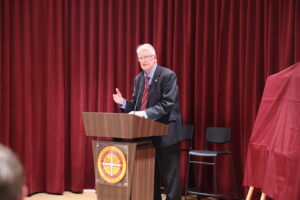Hope in a time of pandemic


Campion president Dr Paul Morrissey has written an uplifting peace on maintaining hope during the Coronavirus lockdown in the latest edition of The Catholic Weekly:
Hope is indeed a good thing and for Catholics it is one of the theological virtues we receive at baptism. At this time of confinement, it is important for us to cultivate this virtue and to remember that our true hope is in the risen Lord, a hope we are celebrating in the Easter season.
The social distance restrictions associated with Covid-19 were easily relatable to the season of Lent. We are all experiencing a forced detachment or penance from various entertainments and pastimes, from restaurants, from social gatherings, etc. This “penance” however is far less easily relatable to the Easter season, which is a call to feast with joy. So how to live Easter joy in this time of pandemic? The key is hope.
Hope is the virtue that embraces the present (it is realistic) but in the context of providence and eternity. Hope is neither optimistic nor pessimistic, both of which are personality traits. Rather, hope is seeing things supernaturally through the eyes of faith. This supernatural faith believes in God’s plan for me, believes in salvation history, believes in Jesus Christ, the saviour of the world, believes that he rose from the dead, believes in the resurrection of the body, etc. To see the past, the present, and the future through eyes of faith gives us hope. In more colloquial terms, hope is the virtue by which we “keep our chin up”, looking to the horizon. It is the opposite of “naval gazing”, which is a self-absorbed looking at my own situation and difficulties. Christian joy is borne from this hope.
In this time of seeming penance we can cultivate Easter joy in many ways, but one way that may be particularly helpful is focussing on peace. The world around us is more silent, calm, and conducive to listening to God. With public worship not possible, it is in our homes or gardens where we need to hear the voice of God. St Francis de Sales, in his spiritual classic, Introduction to the Devout Life, writes that we need to listen to the inspiration of the Holy Spirit, who is constantly whispering little words of counsel. If we hear this inspiration, we will contemplate it and it will give us delight. If we consent to it, we will grow in virtue and holiness. With fewer distractions this Easter season perhaps we will be more attentive to the Holy Spirit and can grow in virtue.
In previous times of pandemic there has been a renewal of spirituality within the
Church. This renewal focussed on the humanity of Christ, especially his suffering, and was focussed away from the normal environs of the parish church because of disease. For many of us this time is marked by solitude and the phrase, ‘social distancing’ has a rather menacing tone. A spirituality of the humanity of Jesus invites the Lord into our home as a friend. Jesus was alone, he wept, he ate, he slept, he drank, he prayed, he obeyed, he was a child, he played, he (we presume) laughed, he visited and healed the sick, he was scared, he sweated, he was insulted, he was angry, he bled, he loved, he was betrayed, he died, he rose from the dead. It is this Jesus who we invite into our home and hearts, it is this Jesus who is our hope and joy.
At the end of “Shawshank Redemption,” the hope of the two prisoners is realised. Andy has dramatically escaped and Red is finally paroled. As he travels to Mexico to see his friend Red says to himself, "I find I'm so excited that I can barely sit still or hold a thought in my head. I think it's the excitement only a free man can feel. A free man at a start of a long journey whose conclusion is uncertain. I hope I can make it across the border. I hope to see my friend and shake his hand. I hope the Pacific is as blue as it has been in my dreams. I hope.”
Read the Catholic Weekly online.



